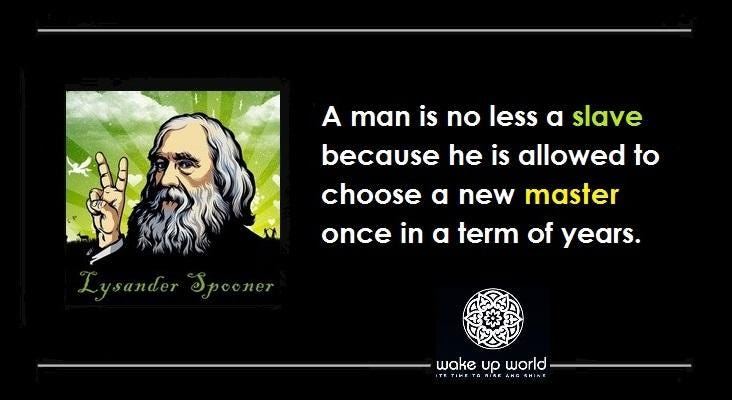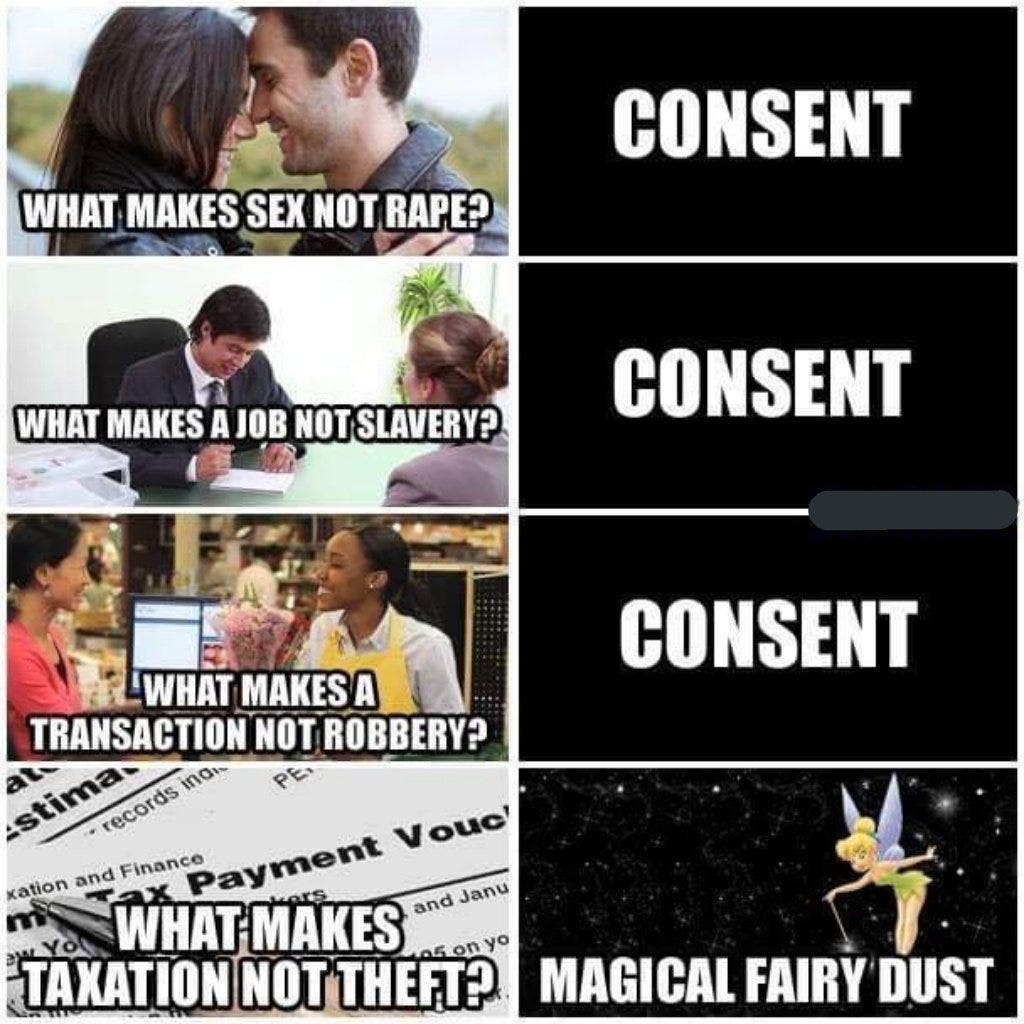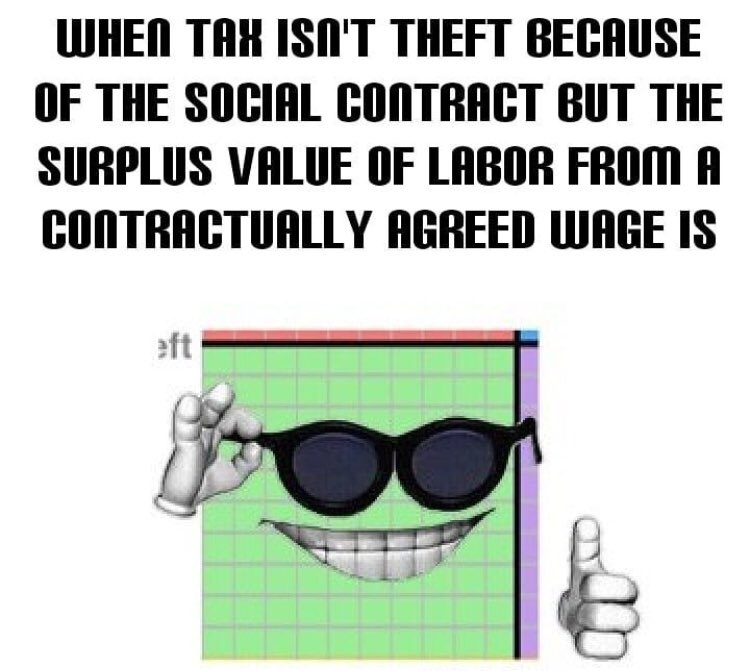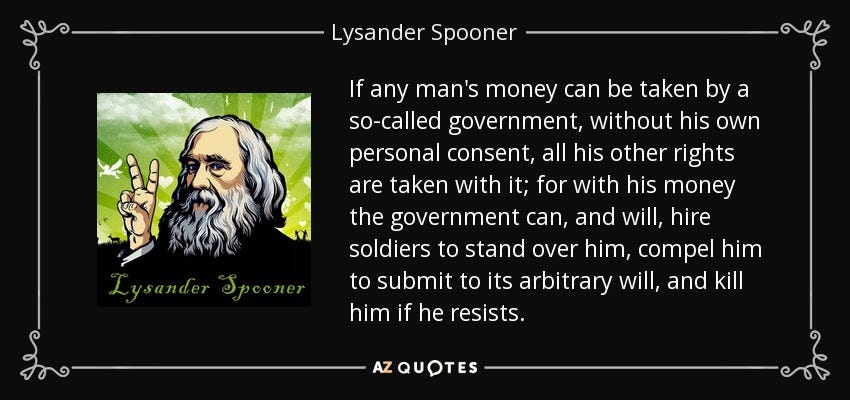Taxation Is Theft
What is the moral justification for taxation? What gives the government the right to collect taxes by force, whether force of law or force of arms--which in the end amount to the same thing?
The coerced collection of taxes is allegedly justified by four arguments--all of which are demonstrably false:
1. The "majority rules" denial that taxation is theft:
The majority in a society has the right to impose its will on the minority, either absolutely, or within the limits prescribed by a Constitution.
The refutation: It's been said that a democracy is where two wolves and a sheep vote on what (or who) is for dinner. The moral to be understood from this is that a vote by the wolfish majority to have the sheepish minority for dinner does not justify violating the rights of the sheep to life, liberty and property. By the same reasoning, just because a majority votes to put those who don't "voluntarily" pay taxes in jail does not make it morally right.
The "majority rules" argument is based on the false premise that what just one of your neighbors would not have the right to do--appropriate your property using unjustified coercive force--society as a whole (who are just the aggregation of all your neighbors) somehow magically is morally justified in doing. Were that thesis ethically valid, what principle would limit it just to taxes, or to just those things allowed by a Constitution? Where did society get the authority to use a Constitution to give its agent, the state (i.e., “the government,”) powers that none of the individuals in the society possess by themselves as single individuals?
If your neighbor does not have the right to force you to be his slave, could it be that two of your neighbors have this right? If not two, then what about 1000 of your neighbors? 10,000 neighbors? 100,000 neighbors? 250,000,000 neighbors? Everyone living on the same continent? What gives a group (or a society, or its agent, the state) any right to act that any individual member of the group would not have?
Rights are not additive: Two people who form a group have no more rights than either one has separately. The rights of any group, even society as whole, are simply the union of the rights of all the individuals in the group. They are not the sum, for otherwise any two people could rightfully defraud, steal from, assault or even kill any other single individual.
The actions of the slave owners in the Southern United States, and those of the National Socialists in Germany’s Third Reich, were not made rightful by the fact that majorities voted in favor of what they did to their victims.
It therefore necessarily follows that a group cannot have any rights that any individual member of the group does not also have. So if your neighbor has no just right to simply take from you whatever he or she wants, then neither do any group of neighbors--not even the entire society.
The conclusion is inescapable: you don't owe taxes merely because one or more of your neighbors say you do—for the same reason that a group of robbers who accost you in a dark alley have no right to take your wallet, simply because they outnumber you two-to-one.
I don't have the right to take your property without your consent. Therefore, no group of people has the right to take your property without your consent—no matter how many people are in the group, nor how many of them vote in favor.
Majority rule is just a form of “might makes right.” It’s ethically abhorrent.
2. The "debt for services rendered and benefits received" denial that taxation is theft:
Government provides benefits and services. The recipients of said benefits and services owe the government something of value in exchange. Furthermore, society is entitled to a "payback from," or "return on its investment in," each member of the society, and a "return on its investment" in the infrastructure of the society, payable as "dividends" from the earnings of the individuals who live in and benefit from the society and its infrastructure.
Summary of the refutation: The denial falsely assumes that a valid debt is created whenever someone receives either direct (or collateral) benefit(s) as a result of actions voluntarily performed by someone else--even when the person receiving the benefit(s) did not consent to the creation of a debt, and even when the person performing the action(s) was largely motivated to perform those actions in his own self interest and for his own benefit.
Secondly, the denial falsely assumes that every taxpayer was a willing participant in a commercial transaction, where he agreed to pay a freely-negotiated price for some service or benefit.
Thirdly, it falsely assumes that the amount of tax a taxpayer is assessed is reasonably proportionate to the market value of the services or benefits he or she received.
Finally, the argument falsely assumes that a debt can convey an equity interest in the life, property, or profits of the debtor, without the debtor having consented to the granting of any such equity interest.
Detailed refutation:
Taxation forces you to pay for what you haven't agreed to buy, and/or at a price you haven’t agreed to pay, and/or from a service provider you haven’t agreed to use
It is admittedly possible to accrue a debt without having first consented thereto: Such a debt automatically accrues when the debtor causes harm to the life, liberty or property of someone else without valid cause (justified self defense, for example.) But other than this one exception (infringing on someone else's rights without his or her consent), debts cannot be justly created without the consent of the debtor. Otherwise, legal contracts would be totally unnecessary.
Therefore, you don't owe anyone anything for those things that someone else voluntarily chooses to do without your consent to pay for them. Conversely, you have no right to coerce payment from others who have not consented to pay you for the value of the work you voluntarily choose to do that happens to benefit them.
Even more ludicrous is the idea that you owe anyone anything in exchange for the collateral benefits you may receive as a consequence of actions performed by others. If I choose to build a dam for the twin purposes of generating electricity and controlling floods, solely because the dam benefits me (I make money selling the electricity, and my home is made safer against the threat of flooding), then why should the fact that your home also is made safer against the threat of flooding entitle me to send you an invoice for any part of the cost of building the dam? I would have built the dam whether or not you benefited from it, and whether or not you agreed to pay anything for the privilege of benefiting from the dam.
If you benefit from what someone else has voluntarily done, but have not agreed to provide compensation, then you have no more obligation to pay than does the receiver of any other gift.
As long as we do not violate the rights of others, each of us may do—or not do—as we please. If we do not like the fact that what we voluntarily choose to do happens to also benefit others, our only morally-correct remedy is to refrain from doing such things. If you think otherwise, go sweep the street clean and then send an invoice to the city—or to your neighbors—for the hours worked. Good luck forcing collection.
Taxation forces you to pay the price set by a monopoly provider
Typically, the amount of tax assessed is not reasonably equivalent to the fair market value of the services provided. One important reason that this is true is because the amount of tax that is assessed is not negotiated between "buyer" and "seller" in a free market. Either underpaying or overypaying for goods or services makes one party a thief and the other party the victim of a crime.
Rate-based taxation assumes that the "debt" for government services creates an equity interest
The debt you owe to a lien-holder does not entitle the lien-holder to an equity interest in your life, in your property, and/or in the fruits of your labor. If you think otherwise, try billing (or even suing) your employer for a percentage of profits in lieu of salary, without his prior agreement. Good luck with that.
3. The "social contract" denial that taxation is theft:
A society has the right to dictate to all members of (or residents in) the society what each individual must contribute (or "give back") in exchange for being allowed to live in, and/or be a member of, and/or receive benefits and services from, the society. By agreeing to live in a society, an individual is deemed to have "consented" to this "social contract."
The refutation: This argument is based on the false premise that "society" as a whole has a right to coerce consent to debts as a condition for being "allowed" to be a member of the overall society.
A society is just a group of people who interact. It has no more rights or powers than does any one of its members. Therefore, unless some individual member of a society has the right to coerce other members of the society to agree to conditions in exchange for membership in the society, then it cannot be that the society as a whole has any such right.
It's true that an individual has the right to refuse to interact with any other individual. However, each adult only has the right to make such decisions for himself, not for other adults. Therefore, even though 67% of the citizens of a particular community do not wish to interact with a particular person, the remaining 33% would still have the right to do so, if that is their wish.
No person, or group of persons, has the right to prevent any two adults from interacting, as long as both adults freely choose to do so. It therefore follows that the only way that an individual can morally be denied permission to be a member of society as a whole, is for all the other members of the society to unanimously—and permanently—refuse to interact with him or her.
Therefore, society as a whole has no right to demand that individuals agree to conditions in exchange for being allowed to participate in the society—because society has no right to prevent free association (or interaction) among consenting adults. You have the right to interact socially, economically and politically with anyone who is also willing to interact with you, regardless of how many third parties may object.
In fact, the only way that someone could be expelled from society would be to violate the rights of the one expelled. Society would have to kill the person, and/or steal his or her property, and/or forbid him or her the right to live on his or her property, and/or interdict his or her right to contract with others for a place to live and/or to produce income, and/or violate his or her right to travel.
But no one has the right to deny anyone the right to live, to own property, to travel, to engage in commercial transactions with others who are willing, or to do anything whatsoever so long as no else’s rights are being violated. Therefore, society has no right to do any of these things, and so it therefore has no right to threaten to do them unless individuals agree to be taxed. Such a threat would be extortion—a fancy word for theft.
You have inalienable rights because you are a person, not because you agree to pay taxes. To make the free exercise of your rights contingent on the payment of taxes converts inalienable human rights into privileges that must be purchased. That way lies slavery.
Society is an epiphenomenon that emerges from the actions and interactions of the individuals of which it is composed. Society is thus a creation and manifestation of its members, who are therefore its rightful masters. To posit instead that society rightfully owns and controls the individuals who are its members wrongfully makes each individual a slave to the group. Others do not own you just because you interact with them. Neither do you own others because they interact with you. Therefore, society does not own you because you live in it.
It must also be noted that the so-called "social contract" is not properly a "contract" at all. At no time are individuals ever told what are the conditions of the "social contract" to which they must agree. At no time are individuals ever asked to formally agree to the terms of this alleged contract. I have never agreed to any such contract, and I strongly doubt that anyone who ever reads this essay has ever done so, either. The alleged "social contract" is therefore nothing more than a fictitious "blank check," drawn on the life, liberty and property of the enslaved population, that those in power can cash in any amount that suits them, at any time—again and again.
4. The "moral debt to those in need" denial that taxation is theft:
Those who have more than they need are morally obligated to provide for those who have less--and it is a necessary and proper function of government to make sure that the "haves" contribute their "fair share" to the "have nots." Therefore, the needs of society for the services and benefits of government outweigh the property rights of individuals.
The refutation: This denial is based on the false premise that the needs of one person constitute a moral debt or lien on the life, property or liberty of someone else. This is a wide-spread, but very dangerous, fallacy. No such principle can be morally justified, because it inevitably leads to logical contradictions that destroy individual life, liberty and the pursuit of happiness. It is maliciously inimical to the very foundations of freedom.
Obviously, if I give (almost) everything I have to charity (or to taxes), then I become the "needy" person, and can then "rightfully" (sic) demand "help" from others. Just by having less, and doing less productive work, I can "create a moral obligation" (sic) for others to provide for my needs. As a result, those of you willing to work become the slaves of those of us willing to leach off the efforts of others. But the resulting "negative feedback loop" must eventually lead to social, moral and economic decay.
To make each individual responsible for meeting the needs of others would have the following consequences:
a) The individual would become a slave to all those with greater need;
b) The principle of "moral risk" would result in many people failing to act responsibly with respect to their own welfare and best interests; and
c) The "haves" would use the fact that they are coerced into supporting the "have nots" to impose laws and regulations restricting everyone's freedom—on the grounds that social welfare paid for by coercive tax collection gives the taxpayers a legitimate stake in preventing citizens from making poor life choices.
Down this path lies tyranny.
Fundamentally, neither my needs, nor someone else's needs, justify coerced taking from others. Just because I need a heart transplant does not justify my taking your heart without permission. Just because my neighbor needs food to eat does not justify either of us taking from you the food you need to feed your family. Just because I and my family need a place a live does not justify my evicting you and your family from your apartment. Need is not a valid or workable basis by which to assign ownership of property. You are not a slave to my needs, nor am I a slave to yours.
The principle that your life, liberty and property belong only to you, and that you have no obligation to give them to others, and cannot rightfully be coerced into doing so, is the foundation of freedom. Any society that violates this principle makes slaves out of its members.
You should not be responsible for the consequences of my actions and decisions, and I should not be responsible for the consequences of yours. Each person must be fully and solely responsible for the consequences of the way he/she lives his/her life.
If you wish to feel guilty because you are able and willing to earn a living, that's your affair. If you wish to donate some or all of what you have to others, that's also your affair: Nothing prevents you from giving as much as you like to the charities of your choice. But you have no right to select the charities that others must contribute to, nor to specify the amount or percentage of their charitable giving. If you did, then they would have the same right with respect to you, and you might not like their choices! They could, for example, then validly claim that you owe them 10 times as much as you claim they owe either you, or society in general.
No one has the right to be "generous" (sic) with other people's money without their permission. That's not generosity—it's theft.
Working to support yourself and your family is not immoral. Expecting to receive the full benefit of the work you do is not immoral. Expecting others not to steal from you is not immoral. Your hard work helps both yourself, your family, your community, your country and the world at large. You owe no one any debt merely for having worked to accumulate property, nor for having done productive work.
Conclusion
The fact that your neighbors have voted in a law that says you owe taxes does not ethically justify involuntary taxation, because others have no right to take your property without your consent.
The fact that you benefit from the operation of the state (i.e., “the government”) does not mean you owe taxes, because no moral debt can be created unless you either have consented to it, or else because you have damaged the person or property of someone else.
The fact that you are allowed to operate as a member of society does not mean that you can be deemed to have agreed to pay taxes in exchange, because a) you have not in fact agreed to any such contract, b) you have the right to interact (and do business with) anyone else who is willing, free from any interdiction by those who disagree, and c) no one has the right to violate your rights, or make the enjoyment of your rights contingent on the payment of a fee—that would be extortion, and extortion is very properly a crime.
The fact that there are those whose needs are greater or more dire than yours does not mean you owe any taxes, because you are no one’s slave, no matter how needy they may be.















What are rights? Where do they come from? Rights are only applicable with corresponding responsibilities. Tax originated as a collective means of defence. To pay for an army. To argue that taxation is theft leaves one with the responsibility of defending their own property. This can be done individually or collectively. The only alternative to small tribes in constant conflict is a return to hunter/gathering which, while perhaps nutritionally optimal for a small number of people in a re-wilded environment, isn’t able to feed current populations. You could argue that it’s gone way beyond what was originally consented but voting used to be a right with the corresponding responsibility that all men of fighting age could be conscripted to a war when required. Sure, it’s not a perfect system and demands eternal vigilance as it can be easily corrupted. But believing that capitalism will provide a working economy and liberated citizenry is as utopian as the socialist dream.